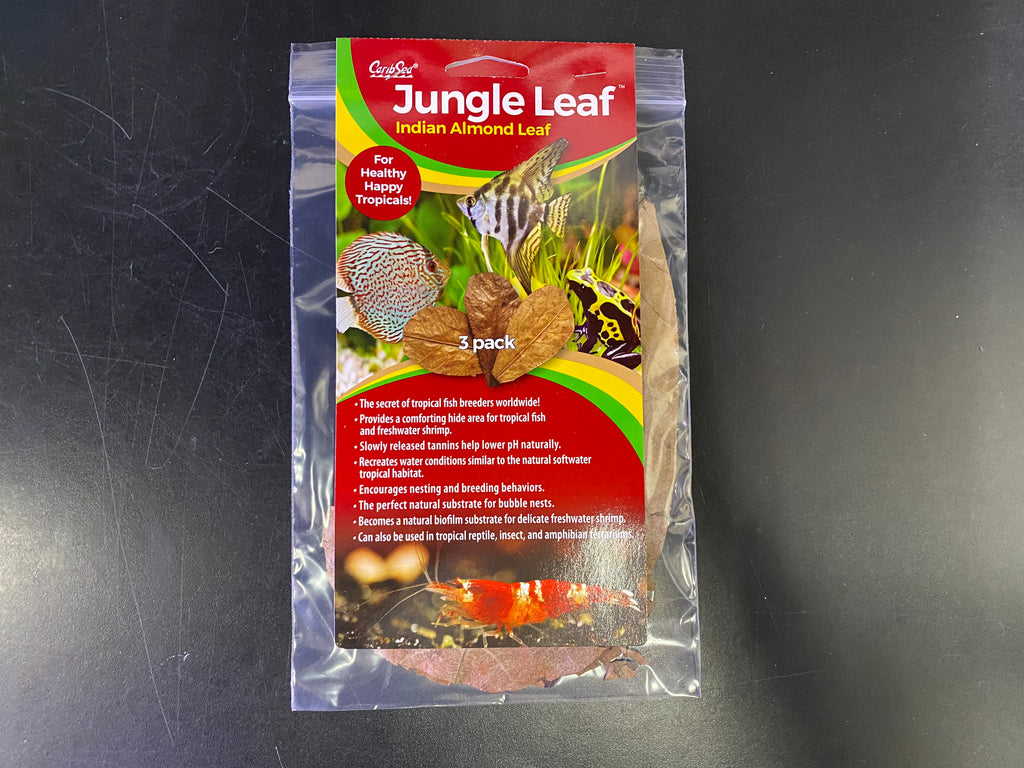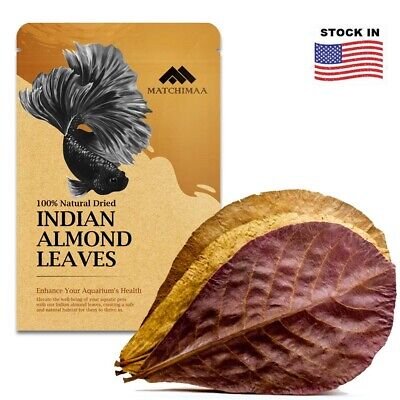Indian Almond Leaf helps improve shrimp health by reducing stress and preventing bacterial infections. It enhances water quality and promotes better molting.
Indian Almond Leaf, also known as Catappa leaf, is a natural remedy for shrimp health problems. Shrimp enthusiasts use these leaves to maintain optimal tank conditions. The leaves release beneficial tannins and humic acids into the water. These compounds have antibacterial and antifungal properties, which protect shrimp from diseases.
The tannins also lower pH levels and soften the water, creating a more suitable environment. This natural approach reduces the need for chemical treatments. Proper use of Indian Almond Leaf results in healthier, more vibrant shrimp. This method is both cost-effective and eco-friendly, making it popular among aquarists.

Credit: flipaquatics.com
Importance Of Indian Almond Leaves
Indian Almond Leaves are crucial for shrimp health. They offer numerous benefits. These leaves help maintain water quality. They also prevent common shrimp diseases. Understanding their importance can improve your shrimp’s well-being.
Natural Benefits
Indian Almond Leaves have natural antibacterial properties. They help fight harmful bacteria. This reduces the risk of infections.
These leaves also have antifungal properties. They prevent fungi growth in your tank. This keeps your shrimp healthy.
Another benefit is their ability to lower pH levels. They create a more acidic environment. This is similar to shrimp’s natural habitat.
Indian Almond Leaves also release tannins. Tannins have multiple health benefits. They improve shrimp’s immune system. They also reduce stress levels.
Nutritional Value
Indian Almond Leaves provide essential nutrients. These nutrients are vital for shrimp growth.
They contain minerals like calcium and magnesium. These minerals strengthen shrimp shells. They also aid in molting.
The leaves also have vitamins. Vitamins boost shrimp’s overall health. They enhance their color and vitality.
Here is a table showing the nutritional content:
| Nutrient | Benefit |
|---|---|
| Calcium | Strengthens shells |
| Magnesium | Aids in molting |
| Vitamins | Boosts overall health |
Using Indian Almond Leaves can transform your shrimp tank. It creates a healthier environment. It also provides essential nutrients.

Credit: www.amazon.com
Common Shrimp Health Problems
Indian Almond Leaves are great for shrimp health. They create a natural environment. Yet, shrimp still face health issues. Knowing these problems helps in early detection and treatment.
White Spot Disease
White Spot Disease is a common issue. It’s caused by a virus. The virus spreads quickly in shrimp tanks.
- Symptoms: White spots on the body and legs.
- Causes: Poor water quality and stress.
- Treatment: Improve water quality and use antiviral medications.
Bacterial Infections
Bacterial infections also affect shrimp. These infections can be deadly. They often occur due to poor tank conditions.
- Symptoms: Red spots, swollen body parts.
- Causes: Dirty water and leftover food.
- Treatment: Antibiotics and clean tank maintenance.
| Problem | Symptoms | Causes | Treatment |
|---|---|---|---|
| White Spot Disease | White spots on body and legs | Poor water quality, stress | Improve water quality, antiviral meds |
| Bacterial Infections | Red spots, swollen body parts | Dirty water, leftover food | Antibiotics, clean tank |
Role Of Indian Almond Leaves In Health
Indian Almond Leaves play a crucial role in promoting shrimp health. These leaves are a natural remedy for various health problems. They offer numerous benefits, especially for shrimp. Let’s explore their key benefits.
Antibacterial Properties
Indian Almond Leaves possess strong antibacterial properties. These properties help combat harmful bacteria in shrimp tanks. This keeps the water clean and safe for shrimp.
These leaves release beneficial substances when submerged in water. These substances, like tannins, fight off harmful bacteria effectively. They protect shrimp from infections and diseases.
A table below highlights the antibacterial benefits:
| Benefit | Description |
|---|---|
| Reduces Bacteria | Keeps harmful bacteria levels low. |
| Prevents Infections | Protects shrimp from bacterial diseases. |
Stress Reduction
Indian Almond Leaves help in stress reduction for shrimp. High stress levels can lead to health issues. These leaves create a natural and calming environment.
They release compounds that mimic the shrimp’s natural habitat. This makes shrimp feel more comfortable and less stressed.
Below are ways these leaves reduce stress:
- Provides hiding spots for shrimp
- Improves water quality
- Releases calming substances
Using Indian Almond Leaves can significantly improve shrimp well-being. They ensure a healthier, stress-free environment for shrimp to thrive.

Credit: kingkoigoldfish.com
Identifying Health Issues Early
Indian Almond Leaf Shrimp are beautiful and delicate creatures. Identifying health issues early is crucial for their well-being. Early detection can save their lives. Let’s explore the signs to watch for.
Behavioral Changes
Behavioral changes are the first indicators of health problems. Keep an eye on their activity levels.
- Reduced Activity: Healthy shrimp are usually active. If they move less, it might be a problem.
- Hiding More Often: If they hide more than usual, they might be stressed or sick.
- Erratic Swimming: Swims erratically? This could signal health issues.
Physical Symptoms
Physical symptoms give clear signs of health problems. Regularly inspect your shrimp for these signs.
| Symptom | Description |
|---|---|
| Discoloration | Healthy shrimp are vibrant. Pale or dark colors could signal illness. |
| White Spots | White spots may indicate fungal or bacterial infections. |
| Broken Antennae | Check for broken or missing antennae. It could be a sign of aggression or poor health. |
| Swollen Body | A swollen body might indicate internal problems or parasites. |
By identifying these signs early, you can take action to treat your shrimp. This ensures they stay healthy and vibrant.
Solutions For Shrimp Health Problems
Shrimp health issues can be daunting for aquarists. Indian Almond Leaves offer natural solutions. They help maintain shrimp health. Addressing these problems promptly is crucial.
Natural Remedies
Indian Almond Leaves are rich in tannins. Tannins have antibacterial and antifungal properties. They help create a healthy environment.
- Add Indian Almond Leaves to the shrimp tank.
- Leaves release tannins, improving water quality.
- Better water quality leads to healthier shrimp.
Other natural remedies include:
- Garlic: It boosts shrimp immunity.
- Ginger: It fights infections.
- Turmeric: It has strong anti-inflammatory properties.
Medication Options
Sometimes, natural remedies are not enough. Medications can help treat severe infections. Always use medications specifically for shrimp.
| Medication | Purpose |
|---|---|
| Antibiotics | Treat bacterial infections |
| Antifungals | Combat fungal infections |
| Parasiticides | Eliminate parasites |
Use medications carefully:
- Follow dosage instructions strictly.
- Monitor shrimp closely during treatment.
- Isolate sick shrimp when necessary.
Regular water changes can also help. Clean water reduces the risk of disease. Healthy water means healthy shrimp.
Preventive Measures
Keeping your Indian Almond Leaf Shrimp healthy involves certain preventive measures. These measures focus on water quality and a balanced diet. Let’s explore them in detail.
Proper Water Quality
Maintaining proper water quality is crucial for shrimp health. Clean water prevents diseases and stress.
- Test water regularly for pH and ammonia levels.
- Use a good filter to remove impurities.
- Perform weekly water changes of 20%.
- Avoid sudden temperature changes.
Keep the water temperature between 75-82°F. Use a heater if necessary.
Balanced Diet
A balanced diet ensures your shrimp get all necessary nutrients. Poor diet leads to health problems.
- Feed high-quality shrimp pellets.
- Include fresh vegetables like spinach and zucchini.
- Provide occasional protein sources like brine shrimp.
- Avoid overfeeding to prevent water pollution.
Offer food in small amounts twice a day. Remove uneaten food after 2 hours.
Best Practices For Using Indian Almond Leaves
Indian Almond Leaves, known for their medicinal properties, benefit shrimp health. These leaves help in maintaining water quality and provide anti-fungal properties.
Understanding the best practices ensures your shrimp stay healthy. Let’s explore the proper ways to use these leaves.
Preparation Methods
Proper preparation of Indian Almond Leaves is crucial. Follow these steps for optimal results:
- Rinse the Leaves: Rinse the leaves in fresh water to remove dust.
- Soak the Leaves: Soak the leaves in water for 24 hours.
- Boil the Leaves: Boil the leaves for 10-15 minutes to sterilize.
After boiling, let the leaves cool before adding them to your tank.
Dosage Recommendations
Correct dosage is important for shrimp health. Overuse may harm your shrimp.
| Tank Size (Gallons) | Recommended Dosage |
|---|---|
| 10 Gallons | 1 Leaf |
| 20 Gallons | 2 Leaves |
| 30 Gallons | 3 Leaves |
Replace the leaves every 3-4 weeks for continued benefits.
Monitoring And Maintenance
Maintaining the health of your shrimp is crucial. Regular monitoring and proper maintenance ensure their well-being. Indian Almond Leaves can help, but you need to follow a few steps. Let’s dive into the essential aspects of monitoring and maintenance for shrimp health.
Regular Health Checks
Performing regular health checks on your shrimp is essential. Look for signs of stress or illness. Check for unusual behavior, like hiding or lack of movement.
Inspect their physical appearance. Look for discoloration, spots, or fungal growth. Use a magnifying glass for a closer look.
- Check for clear, intact exoskeletons.
- Look for active and energetic movements.
- Ensure they are feeding properly.
Environmental Adjustments
Make necessary environmental adjustments to keep your shrimp healthy. Maintaining the right water parameters is key.
| Parameter | Ideal Range |
|---|---|
| Temperature | 72-82°F (22-28°C) |
| pH | 6.5-7.5 |
| Ammonia | 0 ppm |
| Nitrite | 0 ppm |
| Nitrate | < 20 ppm |
Use Indian Almond Leaves to create a natural environment. They help in stabilizing pH levels.
- Add leaves gradually to avoid sudden changes.
- Replace leaves every few weeks.
- Monitor water parameters regularly.
Proper filtration and aeration are also important. Ensure your tank has good water flow and oxygen levels.
Frequently Asked Questions
Are Indian Almond Leaves Safe For Shrimp?
Yes, Indian almond leaves are safe for shrimp. They improve water quality and provide beneficial tannins.
Do Indian Almond Leaves Raise Ammonia?
No, Indian almond leaves do not raise ammonia. They help reduce ammonia levels and improve water quality.
What Is The Disease In The Almond Leaf?
Almond leaves can suffer from diseases like rust, shot hole, and leaf blight. These impact leaf health and productivity.
Can You Use Too Many Indian Almond Leaves?
Using too many Indian almond leaves can lower pH levels excessively, harming fish. Limit usage to avoid over-acidification.
Conclusion
Indian Almond Leaves can significantly improve shrimp health. They help in preventing diseases and promoting a healthy environment. Regular monitoring and proper use ensure shrimp thrive. Incorporate these leaves into your shrimp care routine for better results. Your shrimp will thank you with improved vitality and longevity.
